Many dogs adore peanut butter as a treat, and it’s a pleasant and adaptable approach to teach and reward our furry pals. The main topic of this article is “How Much PB Can A Dog Have?” Our goal is to give readers a thorough grasp of the proper dosages and possible dangers of giving peanut butter to dogs.
Considering aspects such as size, breed, and general health, we will investigate the elements that determine how much peanut butter is healthy for various dogs, considering moderation’s significance. We will also talk about the essential components of peanut butter that may be dangerous under certain conditions, such as the presence of Xylitol. This sweetener is poisonous to dogs.
It is important to remember that every dog is different regarding their nutritional requirements and medical issues, even if this article provides insightful advice. Therefore, before giving your dog peanut butter or any other new food, we highly suggest speaking with a veterinarian. By taking this precaution, you can be confident that your pet will continue to flourish under your tender care and that their specific health needs will be satisfied.
Table of Contents
The Nutritional Profile of Peanut Butter
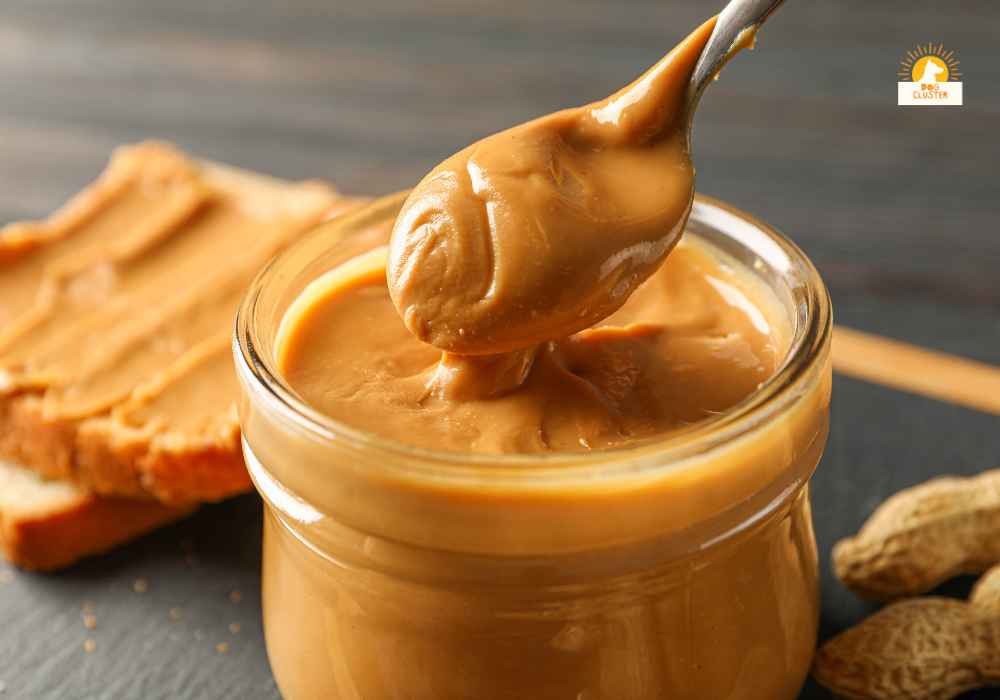
Peanut butter is nutritional because it balances the three macronutrients. Here’s a detailed
breakdown of its nutritional content and benefits:
Macronutrients in a 3.5-ounce (100-gram) Serving:
Carbohydrates:
It contains 22 grams, which is about 14% of its calorie content. Of this, 5 grams are dietary fiber.
Protein:
It offers a substantial 22.5 grams, making up another 14% of its calories. This is a significant amount for a plant-based food.
Fat:
It is rich in fats, with 51 grams per serving, accounting for approximately 72% of its total calorie content.
Caloric Density:
- Peanut butter is relatively high in calories, with a 3.5-ounce (100-gram) serving providing about 597 calories.
- Despite its high-calorie count, the fat in peanut butter is predominantly healthy, consisting of monounsaturated and polyunsaturated fats.
Vitamins and Minerals in Peanut Butter
Vitamins:
- Vitamin E: Provides 60% of the Daily Value (DV).
- Vitamin B3 (Niacin): Offers an impressive 84% of the DV.
- Vitamin B6: Contributes 29% of the DV.
- Folate: Supplies 18% of the DV.
Minerals:
- Magnesium: Delivers 37% of the DV, essential for bone health and energy metabolism.
- Copper: Provides 56% of the DV, which is crucial for the heart and maintaining a healthy immune system.
- Manganese: Offers a substantial 65% of the DV.
Other Nutrients:
Peanut butter is also high in biotin and contains decent amounts of vitamin B5, iron, potassium, zinc, and selenium.
Caloric Content Impact On Dog’s Diet
The amount of calories in peanut butter may significantly impact a dog’s diet in a few different ways. First of all, there are a lot of calories in peanut butter. This implies that adding even a small quantity of peanut butter may significantly increase a dog’s daily calorie intake. This might worsen weight issues in dogs that are already overweight or have sedentary lives, which may result in obesity. Like in people, obesity in dogs may result in several health problems, such as diabetes, heart disease, and joint discomfort.
However, the high-calorie content of peanut butter may be advantageous for active dogs or those who have trouble maintaining a healthy weight. It may aid these dogs’ weight growth or maintenance and provide a concentrated energy source.
Benefits of Peanut Butter for Dogs
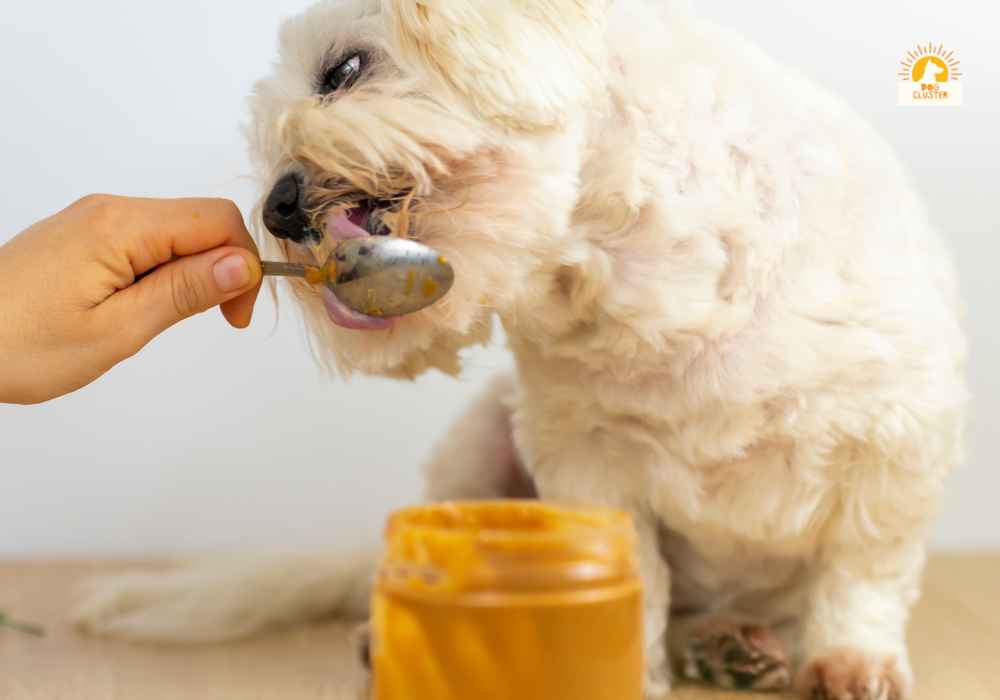
Assistance with Training and Medication
High Palatability:
Peanut butter is an excellent teaching item since dogs typically find it delicious. It may support reinforcement training by serving as a reward for good behavior.
Distraction Tool:
Peanut butter helps distract dogs from painful tasks like nail clipping, making them and their owners more comfortable.
Medication Disguise:
Dogs may find it challenging to take some drugs. Dogs may find it more straightforward to swallow their medicine if the taste and smell are covered up by mixing them with peanut butter.
Advantages of Psychotherapy for the Mind
Relieving Stress:
Dogs may find comfort in chewing and licking. Giving peanut butter as a gift may help reduce anxiety and boredom while stimulating the mind.
Bonding Time:
Since rewards are often connected to affectionate and positive interactions, sharing a treat like peanut butter may help to improve the relationship between a dog and its owner.
Enrichment Activity:
Giving dogs toys filled with peanut butter may be a challenging and satisfying way to keep their minds active.
Peanut Butter Considerations For Dogs
To make sure peanut butter is safe and healthy for your dog, there are a few things you should take into account before providing it to them. Here are some essential things to remember:
| Find Xylitol in the Ingredients: | Always read the peanut butter label. Even in trace levels, the artificial sweetener Xylitol, in particular peanut butter, harms dogs. |
| Steer clear of Added Sugars and Salt: | Go for natural peanut butter with neither added sugar nor salt. Dogs don’t need these substances, and too many may be dangerous. |
| Considerations for Allergies: | Similar to people, some dogs may have peanut allergies. Gradually add peanut butter while watching for any symptoms of an adverse reaction, such as swelling, itching, or upset stomach. |
| Moderation is vital: | Too much peanut butter may cause double weight and other health problems since it is heavy in calories and fat. It should be a special treat provided seldom rather than a consistent portion of your dog’s diet. |
| Peanut Butter as a Treat: | Too much peanut butter may cause double weight and other health problems since it is heavy in calories and fat. It should be a special treat provided seldom rather than a consistent portion of your dog’s diet. |
| Smooth vs chunky peanut butter: | Recall that your dog’s regular, well-balanced meal should not be substituted with peanut butter. It is only appropriate as a supplement or therapy. |
| Take Your Dog’s Size Into Account: | While chunky peanut butter may be a choking danger, particularly for tiny dogs, smooth peanut butter is usually safer. |
| Watch Out for Pancreatitis Risk: | Dogs with pancreatitis should consume a low-fat diet. Given their high fat level, these dogs may not be good candidates for peanut butter. |
| Use as a drug Aid: | If peanut butter doesn’t compromise the drug’s efficacy, it may be helpful in administering medication. |
| Peanut Butter and Physical Health: | Before adding peanut butter to your dog’s diet, ask your veterinarian if they have any particular health concerns, such as diabetes, obesity, or digestive problems. |
| Watch Your Dog’s Reaction: | It’s crucial to keep an eye on your dog after you give it a treat since some dogs may have a personal sensitivity or respond negatively to peanut butter. |
| Peanut Butter Quality: | Choose premium or organic peanut butter. Products of lower quality may have fewer nutritional benefits and more additives. |
Peanut Butter Overconsumption Risks

Like any meal, consuming too much peanut butter may have several adverse health effects. Here’s an explanation:
Obesity and Weight Gain:
Digestive and Pancreatitis:
Allergies & Ingredient Sensitivity:
Dog-Safe Peanut Butter Amount?
It’s crucial to consider the dog’s weight and size while giving them peanut butter and to use moderation to find the proper dosage. While bigger breeds can need one tablespoon, smaller dogs can only require one teaspoon. Considering how heavy in fat and calories peanut butter is, it’s imperative to modify your dog’s diet to prevent weight gain.
Since overfeeding may result in obesity and other health problems, moderation is essential. Given that specific components in peanut butter, like Xylitol, might be hazardous to your dog, it’s also important to consider any unique dietary requirements or medical issues they may have. You can ensure peanut butter is safe and useful for your dog by having regular examinations and consultations with a veterinarian.
FAQ
Is pb bad for dogs?
No, Peanut butter is generally safe for dogs in moderation.
Can all dog breeds eat peanut butter?
While most dogs can eat peanut butter, individual responses may vary. Breeds prone to obesity should consume it more sparingly.
How often can I treat my dog with peanut butter?
Treat your dog with peanut butter occasionally and in moderation, considering it a treat rather than a regular part of their diet.
Can puppies eat peanut butter?
Yes, puppies can eat peanut butter in small amounts. Introducing it slowly and watching for any signs of allergies or digestive upset is advisable.
My dog can have a lot of peanut butter.
Generally, peanut butter should be at most 10% of your dog’s daily caloric intake. The exact amount depends on the size and health of your dog.
Conclusion
In summary, if provided rarely and as long as it’s unsalted, devoid of Xylitol, and hasn’t got any additional sugars or preservatives, peanut butter may be a fun and safe treat for dogs. Responsible dog owners should think about their dog’s food and any allergies that may exist. They should also always see a veterinarian to ensure their dog’s nutritional requirements are addressed.
Share with me if you have any stories and thoughts. I would love to read your feedback. Stay with the dog cluster and gather knowledge about dogs.

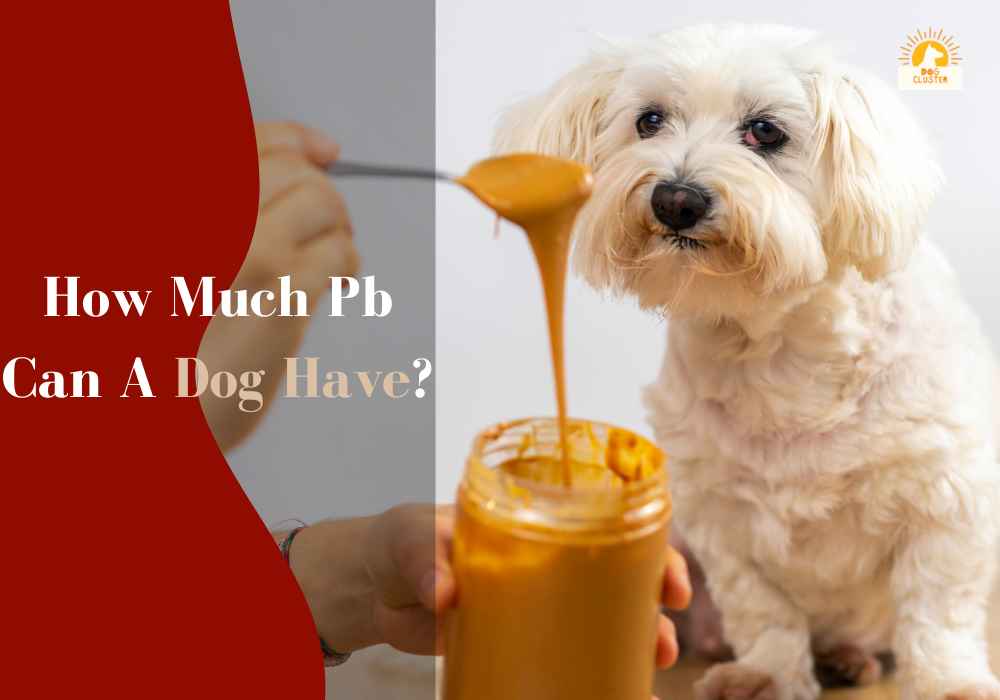
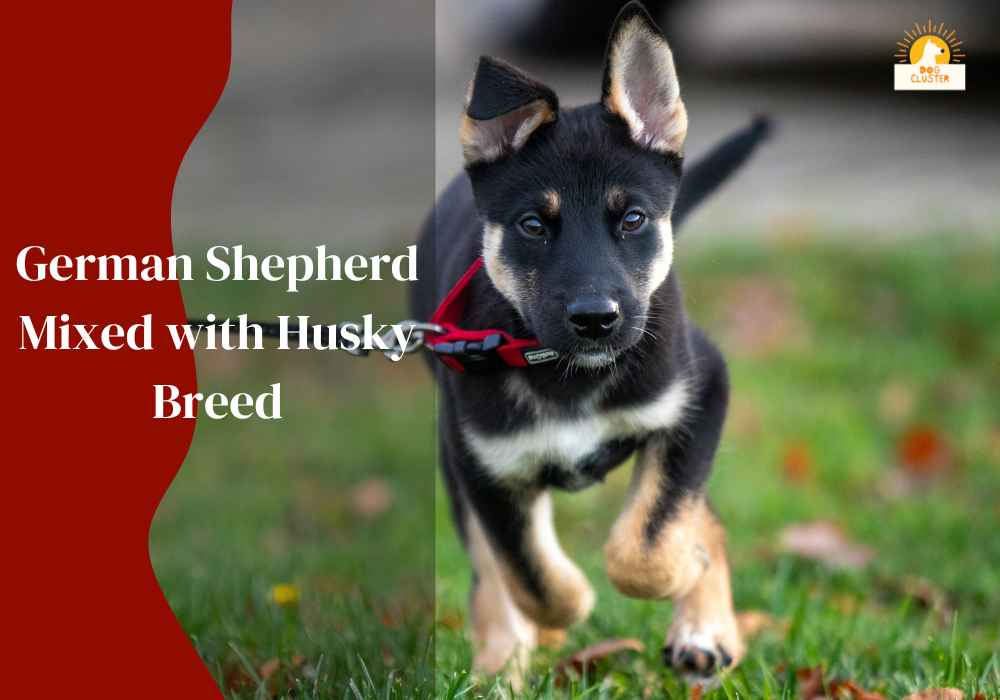

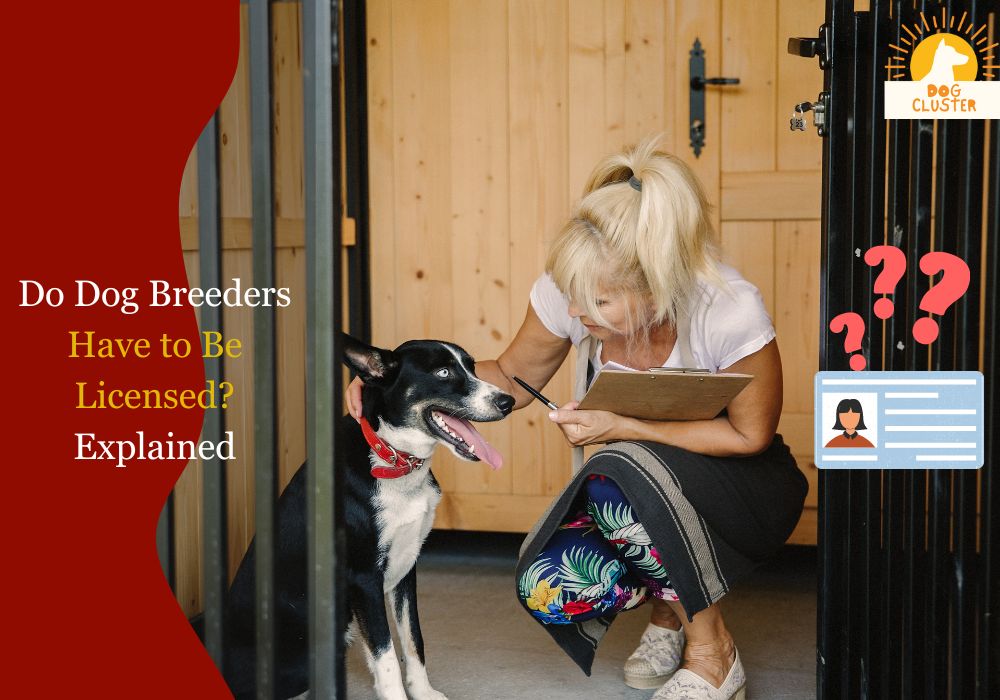
Leave a Reply